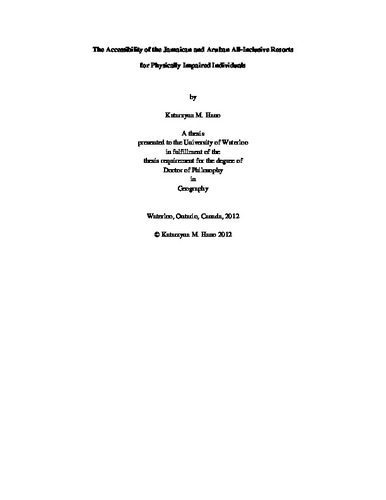UWSpace will be migrating to a new version of its software from July 29th to August 1st. UWSpace will be offline for all UW community members during this time.
The Accessibility of the Jamaican and Aruban All-Inclusive Resorts
| dc.contributor.author | Hano, Katarzyna | |
| dc.date.accessioned | 2012-12-19 17:33:21 (GMT) | |
| dc.date.available | 2012-12-19 17:33:21 (GMT) | |
| dc.date.issued | 2012-12-19T17:33:21Z | |
| dc.date.submitted | 2012 | |
| dc.identifier.uri | http://hdl.handle.net/10012/7164 | |
| dc.description.abstract | An impairment is an attribute of an individual whereas the extent to which it is a disability is influenced strongly by the environment in which they operate which is a product of society. This research focuses on people with physical impairments in the belief that improvements in accessibility for them will decrease the disabling effects of their impairments and improve accessibility for all. A social rather than a medical approach to impairments is adopted. This approach focuses on the abilities of people with impairments and stresses that limitations are placed upon them as a result of the attitudes and actions of the broader society, of which they are a part, the majority of which is comprised of able-bodied people. Thus, this thesis examines the physical barriers experienced by physically impaired individuals and the attitudes held towards them by service providers. The concepts of universal design and barrier-free design are reviewed and used to formulate a comprehensive checklist which is used to measure and compare the state of accessibility of selected resorts in the Caribbean. This checklist is simple to administer and can be used by non-experts. It can also be used to inventory other structures in addition to resorts. The availability of such a tool will enable researchers and facility managers to record information systematically on touristic and other sites. Jamaican and Aruban all-inclusive resorts are examined to obtain a better understanding of the accessibility provisions at all-inclusive resorts for physically disabled individuals. This study is the first to examine all-inclusive resorts for their accessibility. The researcher conducted facility inventories and interviews with staff and guests at three facilities in the Caribbean in order to obtain an understanding of the physical accessibility of the resorts, the staff’s attitudes towards physically impaired guests, as well as guests’ reflections on the treatment of physically impaired individuals by staff. The results show that physical accessibility in the resorts was mixed but that staff attitudes are generally positive. The Accessibility and Attitudinal Barriers Model (AABM) is used to examine the four main areas which need to be improved in order to make traveling for physically disabled persons a pleasure and not a problem. These are accommodation, transportation, recreation activities and staff attitudes. The current research has extended the application of the model both by applying it to all-inclusive resorts and also by incorporating different kinds of information, including that collected by the check list discussed above. This has extended the application of the model and has provided greater understanding of the role of the different sectors of the model in contributing to accessible tourism. Through defining the group under discussion and explaining their difficulties, and examining the barriers that they experience and related policies, the thesis outlines the steps that already have been taken and that need to be taken to make traveling for pleasure available to all individuals. The creation of more accessible tourism establishments could help to remove doubts concerning whether or not impaired tourists travel and whether or not the number of such travelers is increasing. Often, there is a belief that few impaired individuals travel due to financial constraints and this is one of the main reasons why accessibility has not been a priority. It can be argued that, since there are few accessibility provisions for the impaired in tourism establishments, few impaired people travel. Once this barrier is eliminated, it would be more clear whether it is finances that restrict impaired tourists from traveling or whether it is the inaccessible nature of the physical space which leads them to stay home. | en |
| dc.language.iso | en | en |
| dc.publisher | University of Waterloo | en |
| dc.subject | Accessibility | en |
| dc.subject | Caribbean | en |
| dc.title | The Accessibility of the Jamaican and Aruban All-Inclusive Resorts | en |
| dc.type | Doctoral Thesis | en |
| dc.pending | false | en |
| dc.subject.program | Geography | en |
| uws-etd.degree.department | Geography | en |
| uws-etd.degree | Doctor of Philosophy | en |
| uws.typeOfResource | Text | en |
| uws.peerReviewStatus | Unreviewed | en |
| uws.scholarLevel | Graduate | en |

